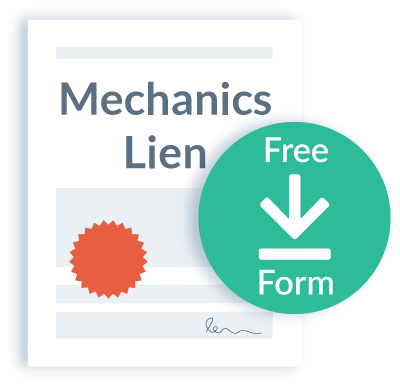
If you’re unpaid on a construction job and looking at options, you will soon be wondering whether you should file a mechanics lien or not. This article explores how a mechanics lien claim actually works, and why it’s so effective at getting contractors & suppliers paid.
Maybe you’ve filed a lien before and it has worked (or didn’t). Maybe it’s the first time one of your non-paying customers got this far and you’re thinking about filing a lien for the first time. In any case, deciding whether to file a lien or not is going to boil down to this: will it work?
As you’ll see in this post, your mechanics lien claim will create a reaction on your project. Frequently, it’s exactly what you need to get paid. While every job and every non-payment situation should not trigger a lien filing, there is definitely a time and place to file a lien.
Every state has their own mechanics lien laws, and the process can be confusing and complicated. But there’s no doubt leveraging your lien rights works. In fact, there’s no other tool that’s quite as powerful as a mechanics lien when it comes to ensuring that you receive your hard-earned construction payment.
Read The Guide to Mechanics Lien Laws
With maps, FAQs, free form downloads, and more
How Do Mechanics Liens Work?
It’s an old story: you’ve invested time and money into a project but still haven’t been paid what you are due.
Why wait any longer? There’s good news out there for unpaid construction project participants: of all of the tools that help contractors get paid, a mechanics lien is perhaps the most powerful.
So what is the exact value of a mechanics lien? Why should you file one and how exactly does it work to get you paid?
To answer these questions, we’ve created this list of 17 different ways a mechanics lien can help you get paid. When you pull the trigger and file your lien, it will create all of these different ripple effects. Some of these effects — or all of them — may tip the scales in your favor and get that unpaid account processed.
A mechanics lien is not the only way to improve the payment process and you’ll have to decide whether filing a property lien is your best option, but it is a reliable way to ensure you get what you’ve earned. This list will help you understand the benefits and effects of filing a lien.
The 17 Different Ways a Lien Gets You Paid
1. A Mechanics Lien Encumbers the Property
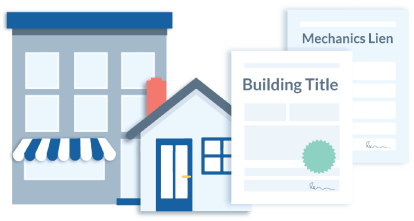
When you file a mechanics lien, the document is actually recorded with land records and appears on a title search of the property. Anyone who buys or accepts the property after the recording of your lien claim (and sometimes, in some states even before the recording), accepts it subject to the claim. As a practical measure, this means the property will not be sold, refinanced or otherwise transferred without the mechanics lien claim being paid or addressed.
How does a mechanics lien actually encumber a property?
Well, imagine you get a phone call one day from an escrow agent or real estate agent asking where and how to wire your funds? That’s what happened to this one contractor in Arizona who posted this question on our Expert Center: Contacted By Escrow Agent about Lien and Home Sale – Will We Get Paid? The unpaid contractor filed a mechanics lien against the home, the home was up for sale, and then – before the sale could go through – the buyer and seller had to get this contractor paid and the lien removed.
2. It Gets the Construction Lender’s Attention
Many construction projects have a construction lender, meaning that the construction is being financed by a bank or third party lender. These lenders are loaning tons of money to the project and they have a mortgage against the project property to secure that claim. When you file a mechanics lien, you are intervening in that security interest. In some states, you’re actually getting priority over the lender’s interest.
This is a big deal to these lenders.
Some states even go further to make construction lenders the protector of the property owner. In Florida, for example, construction lenders have a ton of obligations to protect the property owner against lien claims. If you’d like to see the details on this, take a look at our “Florida Notice of Commencement Checklist & Lien Risk Guide For Owners.” As we state in that article, “the construction lender assumes the obligation to file the notice of commencement and to track all payments to contractors, suppliers, and vendors. In the event of any mismanagement or mistake by the construction lender, the lender is required to indemnify the owner.”
Mechanic lien filings are a major pain and major risk to construction lenders. When you file a mechanics lien, you get the lender’s attention, and they quickly step into a non-payment situation to get it resolved.
3. It Gets the Owner’s Attention
When you file a mechanics lien, you get the property owner’s attention to your non-payment situation. Here are a few reasons why property owners care about mechanic liens getting filed against their property:
- As explored in item #1, the lien attaches against their property. They cannot sell, refinance, or transfer it, and their title is put into jeopardy. The property is an important asset to the owner, and your lien puts it at risk. They care about that!
- When a contractor or supplier files a mechanics lien against a job this can be a signal to the property owner that something is going wrong on the project. In many cases — such as when they have hired a general contractor on the job — the owner may not know about these problems, and may not even know who the subs & suppliers are (much less about slow payment to these parties).
- Many property owners get loans to complete construction on a job. When liens are filed against the job it can really complicate the loan process. The owner may be in default of the loan, and may not be able to convert their high-interest construction loan into a low-interest mortgage, without getting the lien resolved.
- It’s hard and expensive for owners to get lien claims removed without making payment to the contractor or supplier;
Property owners hate mechanic lien claims. These claims get attention and they cost the owner money. When a lien claim is filed, the property owner is at risk of having to pay for the same construction work twice. Clearly, this is something they don’t want to do. As a result, when you’re unpaid on a construction job, you can get attention to your situation real fast with a mechanics lien claim.
4. When Liens Are Filed They Cause Contracts to Get Breached
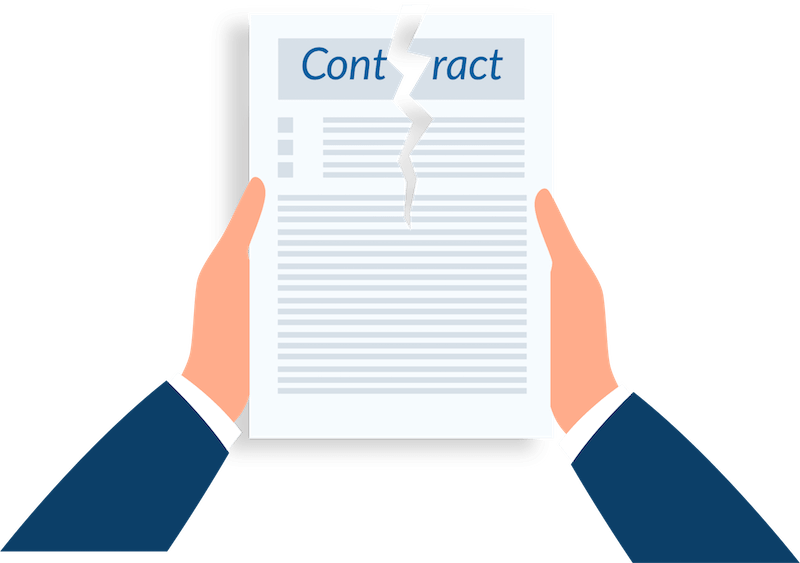
Every construction project has a number of contracts related to it. The property owner generally has a contract with the prime contractor, and the prime with the subs, and the owner with the lender, and the owner with the architect, and the owner with its tenant, and so on and so forth. Read all about construction contracts here.
It’s common — very, very common — that all of these contracts have a provision in them obligating a party to keep the property free and clear of liens. Once a lien is placed against a project, these contract provisions put one party in breach. This breach puts pressure on the breaching party to resolve the lien claim as soon as possible. Things quickly get kicked into gear to get your claim paid.
5. More Parties Become Obligated to Your Debt
If you don’t get paid on a project and you don’t file a mechanics lien, you’ll be restricted to filing suit against the party who you contracted with only. So, if you’re a supplier to a subcontractor, you’d only be able to file suit against that single subcontractor. If you file a mechanics lien, however, you bring a lot of other parties to the table.
Typically, you’re authorized then to file suit against the general contractor and the property owner, and the land itself!
The graphic here shows how this works. Someone not directly contracted with the property owner can leapfrog through the payment chain to make a claim against the owner directly.
Without a mechanics lien, you’re stuck calling your customer over and over again demanding payment, and maybe sending a payment demand letter. A mechanics lien filing (and even a notice of intent to lien demand), however, gets everyone on the job to pay attention to you; lenders, owners, architects, general contractors, title companies, sureties, everyone!
The more parties obligated to pay your debt, the more pockets available to you to collect, and the more likely you’ll get paid.
6. You Set a Firm Deadline For Payment
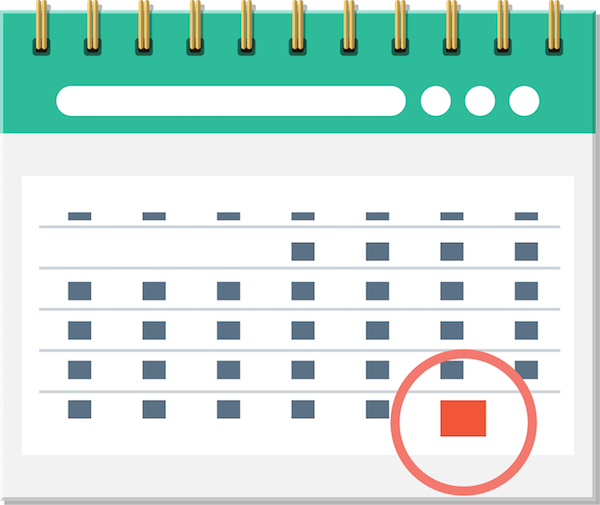
The problem may not be that you’re being refused payment forever. It’s that you’re waiting and waiting and waiting for payment and fielding promises about payment. After all, getting paid in the construction industry is no joke. Slow payment is a clear problem in the construction space.
Research shows that it takes nearly 3 months to get paid after invoicing, on average! You can read about the industry’s payment problems nearly everywhere — check out this discussion on Forbes about slow construction payment. The construction payment survey we completed with Intuit adds on to this as well, showing that cash flow is a concern for nearly everyone in the industry.
So, construction payment is slow by nature!
This is a big opportunity where a lien claim can help.
Filing a mechanics lien sets a firm deadline for resolution of your claim.
Everyone hates litigation, and a mechanics lien will set a firm deadline for when litigation will begin if the claim isn’t paid. Deadlines get folks moving.
7. You Can Always Fall Back on the Property for Payment
One danger whenever you extend any type of credit is that the debtor just won’t pay, and worse, they won’t have any way to pay. Contractors and suppliers are always putting their work & materials out into the construction project before getting paid. They are working on faith that the other party will uphold their end of the bargain.
But what if they don’t?
And worse, what if they can’t?
Worse than someone paying you slowly or refusing to pay you at all, is someone who can’t pay you. Someone, for example, who has filed for bankruptcy protection, or otherwise went out of business (which happens a lot to construction businesses).
When things like this happen, the mechanics lien can be especially helpful because liens give you the authority to actually collect from the property. The real estate itself can be sold at auction to pay your claim, which means that you have to have a perfect storm of defaults to leave your company empty-handed.
8. People Will Pay You to Avoid Dealing With Your Lien
It’s common that you may go unpaid on a construction project because there is some type of dispute preventing payment. Maybe the property owner or general contractor disputes the quality of your workmanship, for example. They may play hardball with you and withhold money as “back charges” claiming default.
Oftentimes, even in these instances, they fold when a mechanics lien is filed.
That’s because dealing with a mechanics lien is expensive, requires attorneys and oftentimes (see below), has a grim outlook.
9. Mechanics Liens Are Hard to Challenge

The right to file a mechanics lien is extremely well protected across the United States. Having its roots as far back as the days of Thomas Jefferson & James Madison, and being considered the first labor laws in the world, the lien right is even bestowed upon contractors and suppliers within some state constitutions, such as in California & Texas! When a contractor or supplier files a lien, it is not removed lightly. In fact, getting a mechanics lien removed is pretty difficult.
If an owner is confronted with a lien claim, their first step is to contact the person who filed it…and pay it! That’s because the alternatives to paying the lien (such as bonding it off) are all pretty expensive, and risky. See some advice given in our Expert Center to questions like “how to remove a mechanics lien” and even “how to remove a frivolous mechanics lien.”
One reason property owners and general contractors pay up when confronted with a mechanics lien is that they are extraordinarily difficult to challenge. If you don’t follow procedures when filing the lien and make a technical mistake, the lien will get tossed quick and easy.
But, if you filed your lien properly, it can be a challenge to get a judge to toss the lien claim. And, it can be risky. Some states, like Washington, will award lien claimants attorney fees if someone challenges the lien claim and fails to win. That’s a big risk factor for those challenging a lien.
10. Lien Claims Help When Parties File for Bankruptcy Protection

When unpaid for services or materials furnished to a construction project, the reason is often that one or more of the parties on the project have sought bankruptcy protection.
This puts most debts in a state of limbo and makes it challenging to collect. Mechanics lien claims help in a bankruptcy situation, though, by doing one or more of the following:
- Securing your debt to put you towards the top of the list of those entitled to payment in the bankruptcy (addressed in #7); and
- Giving you the ability to proceed in court against other parties while the bankruptcy is pending.
This happens a lot, and you can see how some folks have encountered this problem on our Expert Center with questions like these:
- What do you do if the company you want to place a lien against has filed bankruptcy?
- Should I still send out lien notices to a contractor who has already filed bankruptcy?
This is best summed up at the end of an article we’ve published on Bankruptcy & the Mechanics Lien, whereby we say, “all in all, the utility of a mechanics lien claim is hard to understate. In a bankruptcy situation, however, it is literally the best available option.”
11. It Will Freeze Money Flow on the Project

Getting paid on a construction project can be tough because money has to be exchanged across multiple tiers of parties.
The payment chain on a construction job is extremely textured and there are lots of documents, materials, specifications, invoices, pay applications, and dollars that must touch a lot of different hands.
Frequently, money is misappropriated before it ever gets to you. Sometimes, contractors can get underpaid, or overpaid, and cause money problems on the project that impact everyone. Sometimes, there is just a cash flow timing problem.
When you file a mechanics lien you frequently force this flow of money to stop…to your benefit. The lender or the owner will actually stop paying its general or certain subcontractors until it gets assurances that your claim is paid. This helps make sure that you get paid as quickly as possible because the pause in payment on the job gets everyone’s attention.
12. It May Force Parties Into Joint Check Agreements to Benefit You
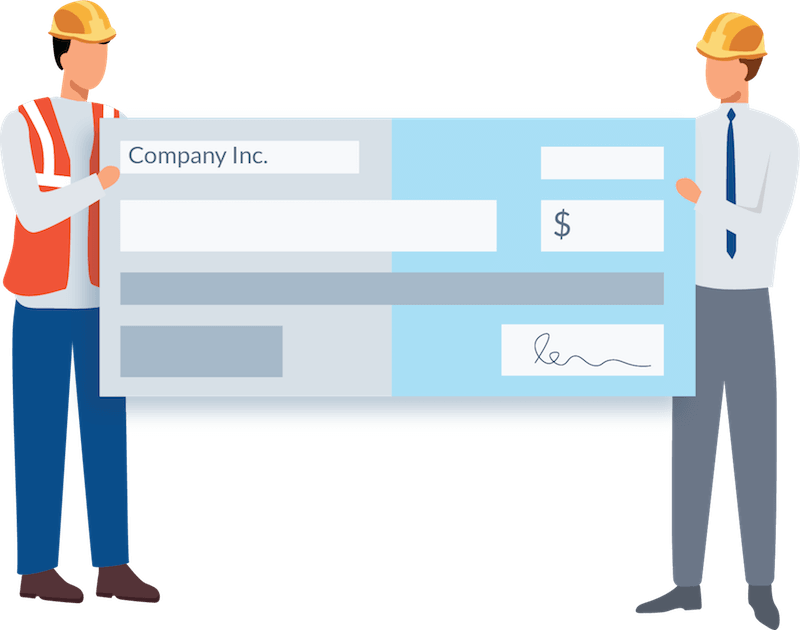
Sometimes, a mechanics lien claim will expose a party’s financial difficulty. For example, you may be supplying materials to a subcontractor going through tough times. When you’re not paid, filing a mechanics lien may be the only way to get the owner and the general contractor’s attention, prompting everyone to look at the subcontractor’s situation and learn that they are not able to pay the bills.
This may result in the parties agreeing to pay you through a joint check on the project, allowing you to continue to profit on the job, but not subjecting you to the financial problems of your customer.
A joint check is a check made payable to two or more parties. A joint check agreement is commonly entered into between a general contractor, a subcontractor and a material supplier. The supplier, being hired by the subcontractor, wants to protect itself against non-payment. All three parties agree that any payments made by the general contractor for work involving the supplier’s materials will be written jointly to the subcontractor and the material supplier.
The joint check process is a great example of how a mechanics lien works to get you paid. Whereas before the lien filing you are exposed to payment going slow, or payment getting misappropriated to another job, after the lien, the parties are moving mountains and engaging in specialized processes to make sure money gets to your company.
13. Lien Claims May Entitle You to Attorney Fees and Other Costs

Typically, when parties have a payment or contractual dispute, the rule is that they must pay their own attorney fees.
This is so universally true that it’s actually called the “American Rule.” The only time you’re entitled to collect attorney fees is when you are eligible to do so by some specific exception (such as if you allow attorney fee collection in your contract). However, even when an exception exists, the American Rule is so strong and so ubiquitous that the exception or situation is often not clear enough to apply.
The risk of paying the other party’s attorney fees is extremely problematic. Even if the unpaid amount is small (for example, $10,000), the attorney fees risk could be extreme, and could easily go over $50,000 or $100,000! This makes it a lot riskier for property owners and others on the project to dispute your debt because if they do dispute and refuse to pay, every day and every move they make subjects them to more expense.
One way that a mechanics lien works to get you paid is by qualifying you to collect attorney fees!
When you file a mechanics lien claim, most states have statutes that allow you to add attorneys fees, collection costs, filing costs, interest, and other expenses and charges on top of the lien claim (remember, though, don’t actually put them in your lien amount).
14. Mechanic Liens Escalate the Situation and Prioritize Your Debt

Sometimes, getting the owner or prime contractor to open the coffers and pay your debt just needs a little push.
In the construction industry, where cash flow is tight, there’s a lot of advantages to managing the “float.” It’s common for contractors and owners to work on “staying ahead” of the other parties. It’s common for general contractors or property developers to use the funds from one project to fuel another.
Filing a mechanics lien escalates your collection efforts and shows the other parties on the project that you’re serious about getting paid.
This prioritizes your debt and gets you paid.
15. Lien Claims May Affect a Contractor’s Bonding Ability
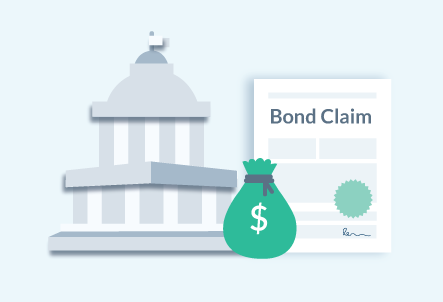
Bonding capacity is really important to a general contractor’s business.
They use this capacity to get the payment bonds and performance bonds that they need to bid on jobs. If their bonding capacity is negatively impacted, a general contractor can actually be unqualified to get future work. As a result, GCs really care about the relationship they have with their sureties.
One way that a mechanics lien works to get you paid is that it could agitate the GCs relationship with their surety, and their bonding capacity.
When you file a mechanics lien claim on a bonded project, the contractor’s bonding company is going to be ticked off. It creates more exposure for them, and they usually require the contractor to answer to them for the lien claim right away. This increased pressure results in getting you paid.
16. Lien Claims Affect Relationships
Typically, the prime contractor has a good relationship with the property owner, the property owner has a good relationship with the lender, and subcontractors have good relationships with the prime contractor. There are relationships all around on a construction project, but they are all very delicate. When a party isn’t getting paid and files a mechanics lien claim, these relationships are heated up to resolve the dispute — resulting in getting you paid.
But don’t get it twisted. If your customer is one you want to keep working with, filing a lien doesn’t have to ruin your business relationship. Open, honest communication is a cornerstone in any relationship, whether professional or personal. Keep the lines open, and treat them with respect — and expect them to respect you in return.
17. Mechanics Liens Create Leverage
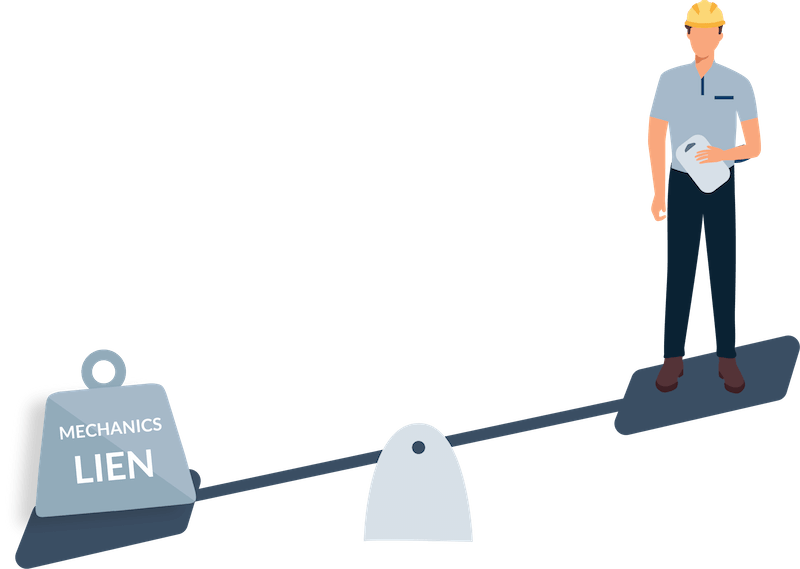
How do mechanic liens work to get you paid? The above 16 items shows some specific ways that a mechanics lien works to impact the project and the parties in ways that loosen up the purse strings in your favor. However, we can sum them all up with one word: leverage.
When negotiating a debt, leverage is everything.
Any attorney or collection agent will tell you, having a mechanics lien connected to a debt is going to significantly increase the chances of having that debt paid. A mechanics lien on the property gives your debt security, it involves more parties, it creates contractual breaches, and it’s hard to remove — a lot of the reasons explained above. For these reasons it creates leverage, which becomes another way the mechanics lien can help get you paid.
What Are the Chances that a Mechanics Lien Will Work?
For anyone who considers filing a lien on a project, this question comes almost automatically comes to mind: “What are my chances that this mechanics lien is going to work??”
Before I take a lawyerly approach the no-frills answer is this: the chances that a mechanics lien works and gets you paid are pretty darn good.
Now for that lawyerly approach…
Before we answer this question, may we respectfully suggest that the question we should really be asking, is this: “Is a mechanics lien more likely to get me paid than some other route to recovering payment?”
The answer to that question – the right question – is a resounding “YES!”
A mechanics lien is the most powerful tool in construction payment, and when a valid lien is properly filed, it’s hard to find a better way to resolve a payment claim.
To better understand the chances of getting paid after filing a mechanics lien, context will help. Let’s take a look at the following:
- What mechanics liens actually do
- How liens are different from other recovery methods
- Why other parties want to avoid liens
1) What do mechanics liens actually do?
We sort of answered this question above.
Mechanics liens secure claims for payment. By filing a mechanics lien, a claimant clouds the title of the property. Understandably the phrase “clouds the title” may itself be a little foggy. Here’s another way to put it: a charge has been placed on the title. When such a charge exists on a property title, selling, transferring, and taking out loans against the property becomes a real headache, and in some cases, becomes flat-out impossible.
This is all due to the power of a mechanics lien. This power rests in the ability to foreclose (aka “enforce”) a lien. By doing so, a claimant can force the sale of the property in order to get paid the money owed.
2) How are liens different from other recovery methods?
The real value in a mechanics lien is obvious when it’s compared to its “peers.” Here are some alternatives for recovering payment in construction: sending continued demands, a breach of contract claim (through collections, arbitration, or litigation), joint check agreements, a promissory note, or a personal guaranty.
But here’s the baseline reason mechanics liens are superior to the above remedies: it’s the only remedy that attaches itself to a debtor’s property. While taking someone to court may seem like the classic route for going after non-payment, litigation is risky and expensive.
3) Why do other parties want to avoid liens?
The “other parties” we speak of are the top-tiered parties on construction projects. Specifically, we’re talking about the project/property owners, general contractors, and lenders. Read on as we’ll briefly talk about each.
Owners
As stated above, a property owner will have a tough time selling, transferring, or taking loans against the property when a lien is present. But what’s the big deal if the owner doesn’t plan on moving or taking out a loan or mortgage? Liens still present an issue.
A mechanics lien foreclosure could force the sale of the property. We probably don’t need to elaborate on that – involuntarily losing your property sounds like a nightmare. But there are other reasons liens are avoided, too.
General Contractors
While not necessarily a reason that an owner would avoid a mechanics lien, construction contracts often require that an owner must be defended and indemnified by a general contractor in the event a lien is filed. If a general contractor does not resolve the lien claim in these cases, they may be liable for all sorts of costs, including potential litigation costs and potential damages resulting from a breach of their contract if lien claims persist.
Construction Lenders
One reason lenders will want to avoid mechanics liens is that mechanics liens relate back. Without getting too technical, when multiple liens or encumbrances lie on a property, the priority (aka “order in which they’re paid”) is often first-to-file (aka “first come, first served”).
When we say that a mechanics lien relates back, this means that the mechanics lien’s priority is not based on when the lien was filed. Rather, the lien will relate back to when work began. If a loan or mortgage was taken against the property after that work begins, the mechanics lien could very well jump to the front of the line for priority purposes.
Bottom Line — Liens Work
Chasing after a delinquent customer – making phone calls, sending emails, and writing demand letters – all seem like fruitless endeavors. No matter how much effort you put into your collection attempts, at the end of the day, there’s nothing really on your side that will force a delinquent customer to pay. It can leave you feeling pretty helpless.
Mechanic liens change all that.
Mechanics liens are powerful, and as we’ve shown above, they give you quite a bit of leverage that can compel a delinquent customer to pay up. Not only are the chances that a mechanics lien will work pretty darn good, a lien is also the best option to remedy a payment situation on a project, by far.
If you’re having trouble getting paid on a project, you should strongly consider filing a mechanics lien. Here’s a guide on how to file your lien. Here’s where you can download free mechanic lien forms.

